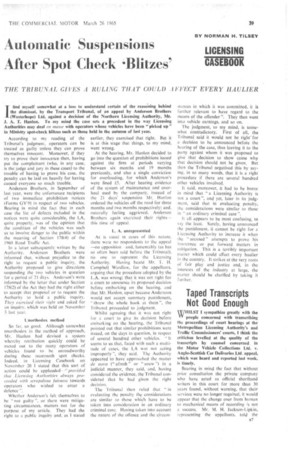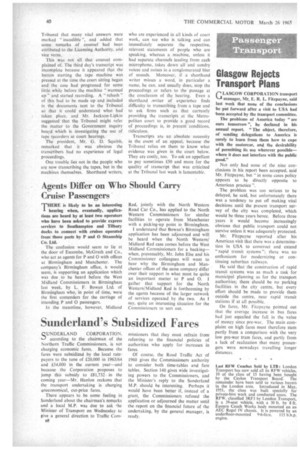Taped Transcripts Not Good Enough
Page 41

Page 42

If you've noticed an error in this article please click here to report it so we can fix it.
winusT I sympathize greatly with the VY people concerned with transcribing the proceedings of court hearings at the Metropolitan Licensing Authority's and Traffic Commissioners' courts, I think the criticism levelled at the quality of the transcripts by counsel concerned. in the Motor Vehicle Collections Ltd. v. Anglo-Scottish Car Deliveries Ltd. appeal, which was heard and reported last week, is timely.
Bearing in mind the fact that without prior consultation the private company who have acted as official shorthand writers in this court for more than 30 years found, without warning, that their services were no longer required, it would appear that the change over from human to mechanical means of recording is not a success. Mr. M. H. Jackson-Lipkin, Fepresenting the appellants, told the Tribunal that many vital answers were marked " inaudible ", and added that some remarks of counsel had been attributed to the Licensing Authority, and vice versa.
This was not all that counsel complained of. The third day's transcript was incomplete because it appeared that the button starting the tape machine was pressed at the time the court sitting began and the case had progressed for some little while before the machine "warmed up" and started recording. A " rehash " of this had to be made up and included in the documents sent to the Tribunal so that it could understand what had taken place, and Mr. Jackson-Lipkin suggested that the Tribunal might refer the matter to the Government inquiry board which is investigating the use of tape recorders at court hearings.
The president, Mr. G. D. Squibb, remarked that it was obvious the transcribers had no experience of legal proceedings.
One trouble lies not in the people who are now transcribing the tapes, but in the machines themselves. Shorthand writers,
who are experienced in all kinds of court work, can see who is talking and can immediately separate the respective, relevant statements of people who are speaking, whereas a machine, unless it had separate channels leading from each microphone—takes down all and sundry voices and noises in a conglomerated blur of sounds. Moreover, if a shorthand writer misses a word, in particular a name, he can, and usually does, stop the proceedings or refers to the passage at the conclusion of the hearing. Even a shorthand writer of experience finds difficulty in transcribing from a tape and to ask firms such as that currently providing the transcripts at the Metropolitan court to provide a good record of proceedings is, in present conditions, ridiculous.
Transcripts are an absolute necessity in the event of an appeal, because the Tribunal relies on them to know what evidence was given in the court below. They are costly, too. To ask an appellant to pay sometimes £50 and more for the quality of transcript that was criticized at the Tribunal last week is lamentable.




























































































































